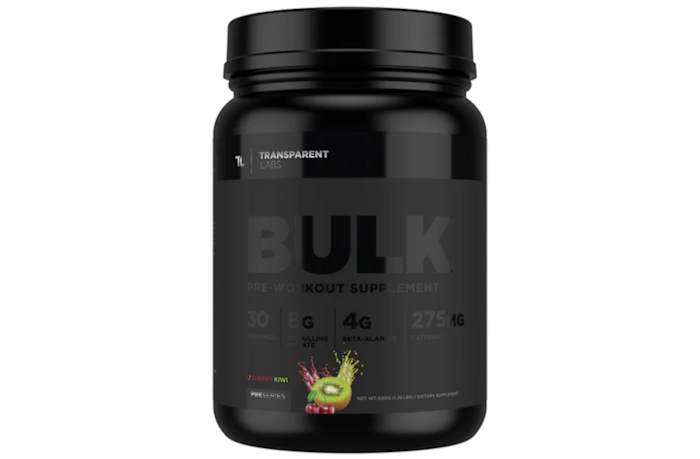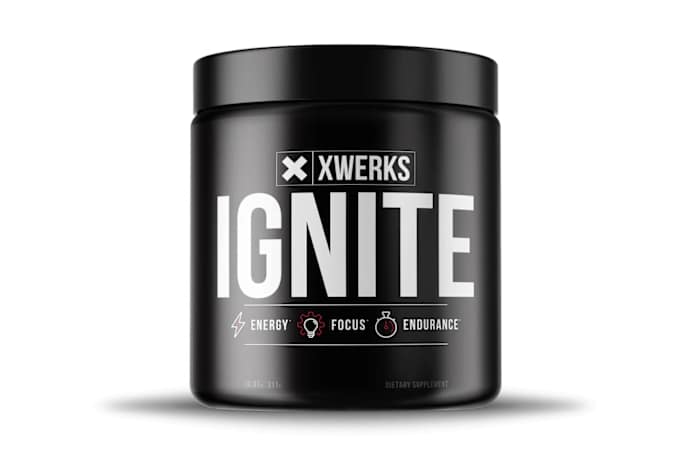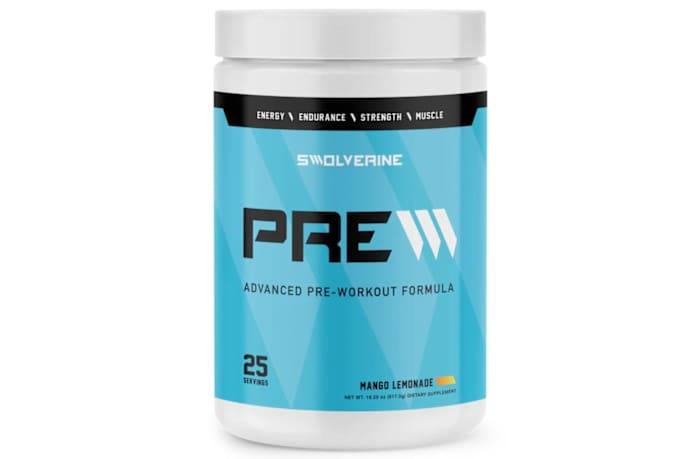The products featured in this article have been independently reviewed. When you buy something through the retail links on this page, we may earn commission at no cost to you, the reader. Sports Illustrated editorial staff are not involved in the creation of this content. Learn more here.
Fueling up before a tough workout can give you the energy boost you need to achieve your fitness or health goals. While you can boost your exercise performance through food, energy drinks or simply staying hydrated, taking a high-quality pre-workout supplement is often more convenient. It can also pack in plenty of ingredients with proven fitness and health benefits that can be tough to get through food alone. Still, sifting through complicated marketing jargon and confusing ingredient lists can make it hard to understand which pre-workout is right for you.
That’s why we’ve assembled a guide with nine common pre-workout ingredients and what they do, so you know exactly what you’re consuming and why. Our list, which is backed up by expert input from certified trainers and nutritionists, can also help you determine which pre-workout formula will be the best choice for your fitness or health goals. Read on to learn about the most popular ingredients in pre-workout supplements, their benefits and which not-so-good ingredients to steer clear of.
Benefits of Pre-Workout
Pre-workout products come with a host of benefits.
“The main role of pre-workout supplements is to improve the quality of your workouts, while also increasing the results you receive from your training sessions,” explains Adam Kemp, a certified personal trainer with an M.S. in nutrition.
Pre-workouts can hydrate you, boost agility and reduce muscle fatigue, increase physical performance or power output and even elevate your mood. Depending on which ingredients your pre-workout supplement includes, you can experience different benefits (which is why it’s so important to understand what the ingredients are and how they affect your body).
As the name implies, these dietary supplements are meant to be taken before exercising. You can mix them into a cup of water or other liquid, or add them to a shaker bottle to take with you for on-the-go fuel. There are also pre-workout supplements designed specifically for women and men. While nutrition coach Joe Johnson says taking a pre-workout won’t directly achieve typical fitness goals like weight loss or building muscle, it can give you the mental and physical energy you need to complete those goals.
“This makes it more likely that you’ll adhere to a workout plan and execute that plan to the best of your ability,” he explains.
Keep reading for common pre-workout ingredients and how they can benefit your athletic performance.
Caffeine
Caffeine is a central nervous system stimulant that occurs naturally in more than 60 plants.
What does caffeine do?
Out of all popular pre-workout ingredients, you’ll probably be the most familiar with caffeine. After all, caffeine is found in coffee, tea, chocolate and even some protein powders. Kemp calls caffeine the “most important ingredient” in any pre-workout supplement.
“Although there are some caffeine-free pre-workout supplements, caffeine is an evidence-based natural stimulant that can boost energy, focus and alertness,” he says, “while also increasing fat oxidation and reducing perceived exertion during exercise.” (Or, the process of turning body fat into lean muscle and how quickly you begin to feel tired while exercising, in more simpler terms.)
Still, some people are sensitive to caffeine (and it can cause side effects like jitters and even insomnia), so it’s important to monitor your overall caffeine intake during the day if you decide to use a pre-workout supplement with caffeine for increased energy levels. You can also develop a tolerance to caffeine, so some people like to use caffeine supplements in cycles.
“A good alternative for some people might be a stimulant-free nootropic supplement,” Johnson suggests, “which can have similar benefits without the side-effects.”
Nootropics are cognitive-enhancing molecules. You can also take a high-quality vitamin for energy if you’re sensitive to caffeine.
BCAAs
BCAAs, or branched-chain amino acids, are essential nutrients found in food that your body uses for energy. BCAAs include valine, leucine and isoleucine.
What do BCAAs do?
BCAAs help promote muscle protein synthesis, or the process of creating new muscle protein that essentially generates changes in muscle mass. They can also assist in the workout recovery process and eliminate soreness.
“Some pre-workout supplements contain BCAAs, which can reduce muscle damage,” Johnson explains. “BCAAs are the building blocks of protein, so they offer all the benefits of a whey protein powder with a fraction of the calories.”
The downside of BCAAs, however, is that they are “incredibly expensive when you compare them to a whey supplement from a protein content perspective,” Johnson adds. On the flip side, many pre-workout supplements with BCAAs also have electrolytes, which help you stay hydrated.
Related Post: The Best BCAA Supplements for Your Workout Routine
Creatine
Creatine, or creatine monohydrate (its most-studied form), is an amino acid naturally found in muscle cells and in the brain.
What does creatine do?
Creatine is often the pre-workout ingredient of choice for bodybuilders or weightlifting, since creatine is typically used to improve exercise performance and muscle mass. Studies show that creatine supplementation for short-duration, high-intensity exercise in particular can lead to increased lean muscle mass and exercise capacity (or how hard you can work out).
“Creatine can help increase strength and power output during resistance training,” Johnson says. “Creatine is one of the most studied supplements out there and there are no real downsides to taking it. Be mindful, however, that it may be cheaper to buy a standalone creatine supplement rather than using a pre-workout that contains it.”
Kemp adds that “while creatine is generally safe and well-tolerated, some individuals might experience minor gastrointestinal discomfort or weight gain due to increased water retention [from creatine supplementation].”
Related Post: The Benefits of Creatine
Beta-alanine
Beta-alanine is a non-essential amino acid naturally produced in the body. It aids in the production of carnosine, or protein-building blocks, in muscle cells.
What does beta-alanine do?
Beta-alanine is a common pre-workout ingredient that’s meant to help reduce muscle fatigue post-workout and improve endurance during high-intensity exercise.
“The elevation of carnosine levels helps counteract the build-up of hydrogen ions during high-intensity exercise,” Kemp explains. “This results in reduced muscle acidity, diminished fatigue and enhanced overall performance.”
However, Kemp cautions being patient with potential beta-alanine benefits, as it can take a few weeks to build up in your system with consistent supplementation.
Some people may experience skin paresthesia, or itching and tingling after beta-alanine consumption. While the cause of this sometimes-unpleasant side effect is unknown, it’s more of a nuisance than anything and is relatively harmless, Kemp says. To help minimize the potential of tingling sensations, Kemp suggests dividing a pre-workout supplement with beta-alanine into smaller doses and taking it periodically throughout the day, if a full dose before a workout is causing unwanted side effects for you.
Amino Acids
Amino acids are naturally-occurring organic compounds that combine to form proteins. Your body needs 20 different types of amino acids to function correctly.
What do amino acids do?
In case you’re confused about the differences between BCAAs and amino acids, the simplest way to think about it is that BCAAs are a type of amino acid, while amino acids themselves are the building blocks of protein. Since BCAAs only contain leucine, isoleucine and valine, amino acids are the larger-encompassing group and offer similar benefits. Other examples of amino acids include tyrosine, glutamine and l-arginine.
Nitric Oxide
Nitric oxide is a molecule produced by your body that regulates blood flow by relaxing and expanding blood vessels.
What does nitric oxide do?
With its blood flow and expanded blood vessel benefits, Johnson says nitric oxide can “produce more intense muscle pumps and help improve the delivery of nutrients to the muscle, leading to improved muscle recovery and growth.”
However, he cautions that the muscle growth benefits will likely be minimal, so it’s only something to consider if you’re a serious athlete or bodybuilder. Otherwise, you can expect nitric oxide to have the most impact on nutrient delivery and muscle recovery.
L-Citrulline
L-citrulline, or just citrulline, is a non-essential amino acid that helps promote healthy liver and kidney function. It can also boost your immune system response. You’ll often find it in pre-workout formulas as citrulline malate, which combines l-citrulline with malic acid (some research shows that malic acid may help increase absorption).
What does l-citrulline do?
When it comes to fitness, citrulline is a common ingredient in pre-workouts because it elevates the production of nitric oxide (which itself is also popular in pre-workout formulas).
“These effects increase blood flow and diminish muscle fatigue, ultimately enhancing endurance and overall athletic performance,” Kemp explains. “Additionally, citrulline contributes to ‘increasing the pump’ you get when exercising.”
Side effects of this ingredient are usually minimal, but some people might experience gastrointestinal discomfort at higher dosages, Kemp says.
Betaine
Betaine is a naturally-occurring chemical in the body. It can also be found in foods like beets, spinach, cereals, seafood and wine, with betaine supplements often manufactured from sugar beets.
What does betaine do?
Kemp calls betaine, or beetroot powder, a unique and effective ingredient in pre-workout formulas.
“It can improve workout performance through enhanced blood flow and oxygen delivery to muscles,” he says.
A review of 23 articles from 2010 to 2016 found that beetroot juice supplementation can enhance cardiorespiratory endurance, prolong time to exhaustion and even elevate anaerobic threshold intensities (or how hard you can ultimately exercise).
Taurine
Taurine is a type of chemical known as an amino sulfonic acid (similar to amino acids) and plays an important role in several of the body’s metabolic processes (or overall body functioning).
What does taurine do?
If you consume energy drinks, chances are you’ve seen taurine as a main ingredient on the nutrition label. Taurine is often paired with caffeine to increase energy, and for fitness purposes, it can elevate muscle performance and cardiac function. It can also reduce fatigue and increase endurance, Johnson explains, but he cautions that taurine isn’t as well-studied as creatine.
“It’s certainly not a must-have ingredient,” he says.
What ingredients should you avoid in a pre-workout supplement?
While there are plenty of evidence-based ingredients in pre-workout supplements that can elevate your workouts and bring you closer to achieving your fitness goals, there are also a handful of ingredients that should be avoided - so be sure to read nutrition labels carefully.
Artificial sweeteners
Artificial sweeteners, or sugar substitutes, come with several health risks. Studies have linked artificial sweeteners to an increased risk for heart disease, cancer, weight gain and even type 2 diabetes.
“Some pre-workout supplements may contain artificial sweeteners like aspartame or sucralose, which have been associated with negative health effects,” explains dietitian and nutritionist Melissa Baker, RDN. Therefore, it’s best to avoid artificially-sweetened formulas.
Proprietary blends
Kemp advises “steering clear of proprietary blends that don’t disclose the exact amount of each component,” since this lack of transparency can result in under-dosing or overdosing. So, if you see a pre-workout supplement that doesn’t share precisely how much of each ingredient you’ll get per serving, it’s best to leave it on the shelf and consider formulas that disclose their ratios.
Excessive stimulants
Some caffeine and other stimulants are O.K. (and standard in many pre-workout supplements), but Kemp recommends being mindful of taking excessive stimulants. Excessive stimulants can lead to increased heart rate and blood pressure, and can potentially lead to heart disease.
Our Favorite Pre-Workout
If you’re in the market for a new pre-workout supplement, these are our favorite formulas. Close runner-ups include GHOST LEGEND Pre-Workout, Bucked Up Pre-Workout, Legion Pulse Pre-Workout and C4 Pre-Workout, which are also worth considering.
Transparent Labs Bulk Black
Transparent Labs Bulk Black is a heavy-duty pre-workout that comes in five fruity flavors like cherry kiwi and peach mango. It’s free of artificial sweeteners, coloring and preservatives, and includes evidence-backed ingredients like beta-alanine and citrulline malate to elevate your workout. This formula is best for those looking for testosterone-supporting ingredients, muscle fortifiers and nootropics for enhanced focus, or for more serious athletes and bodybuilders.
For more information, check out our in-depth review of Transparent Labs Bulk Black.
XWerks Ignite
For a pre-workout designed for energy, focus and endurance, look no further than XWerks Ignite. It includes a blend of vitamins and common pre-workout ingredients like B vitamins, calcium, magnesium, caffeine, citrulline malate and beta-alanine. It promises to increase muscle growth and repair, give you crash-free energy and expand muscular endurance and capacity.
Swolverine Pre
Swolverine Pre comes in a tropical mango lemonade flavor and includes clinical dosages of classic ingredients that are combined with powerful antioxidant-rich superfoods. In this formula you’ll find citrulline malate, taurine, betaine anhydrous and beta-alanine, plus coconut water powder, ginseng root extract and pomegranate fruit powder—so you can feel good about this supplement. Swolverwine Pre is best for endurance, muscle soreness and increased strength.
Final Thoughts
Whether you’re seeking out a high-quality pre-workout supplement to give you more energy for extra-heavy reps, to combat muscle fatigue and soreness, or to simply get a boost of nutrients before a tough workout, understanding how to read a nutrition label on a pre-workout formula matters. After all, these labels are often full of unfamiliar (and sometimes confusing) ingredients, so our pre-workout ingredients guide breaks down what exactly those ingredients are and how they can influence your workout. If you’re considering a new pre-workout or you’re browsing our three suggestions above, be sure to read our guide for a simple breakdown of ingredients.
Prices are accurate and items in stock as of publish time.












